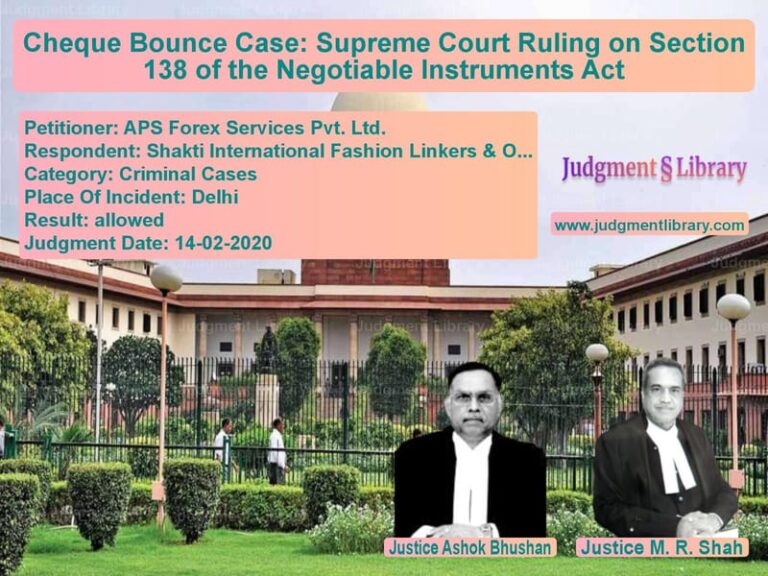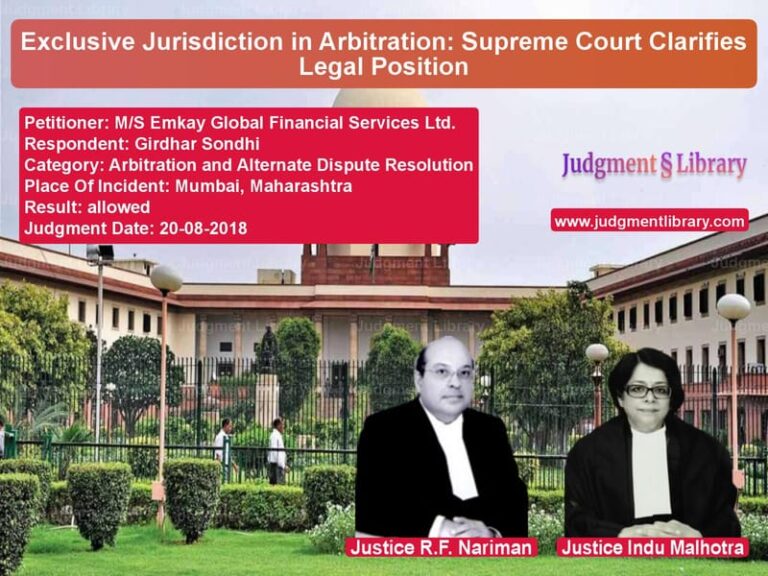Supreme Court Ruling on Re-evaluation of Answer Scripts: NTR University vs. Dr. Yerra Trinadh
The case of Dr. NTR University of Health Sciences vs. Dr. Yerra Trinadh & Others revolves around the issue of whether courts can order the re-evaluation of answer scripts in academic examinations when there is no explicit provision allowing such re-evaluation. The Supreme Court examined whether the High Court was justified in directing the re-evaluation of answer scripts despite the absence of any such provision in the university regulations.
Background of the Case
The case originated when the respondent students, who appeared for their post-graduate diploma course examinations conducted by Dr. NTR University of Health Sciences, were dissatisfied with their results. The university had adopted a digital evaluation method for assessing the answer scripts.
The respondents filed writ petitions before the Andhra Pradesh High Court, seeking re-evaluation of their answer scripts. The learned Single Judge found discrepancies in the digital evaluation process and ordered the re-evaluation by a new set of four fresh examiners, as per prevalent MCI (Medical Council of India) norms.
When the university appealed, the Division Bench upheld the Single Judge’s order. Consequently, the university challenged the decision before the Supreme Court, arguing that there was no provision in its rules for re-evaluation.
Key Legal Issues
- Whether a High Court can order re-evaluation of answer scripts when no provision exists for such re-evaluation.
- Whether the digital evaluation process adopted by the university was valid and complied with fair evaluation standards.
- Whether judicial review under Article 226 of the Constitution extends to academic matters like evaluation of answer scripts.
Arguments by the Petitioner (Dr. NTR University of Health Sciences)
The university put forward the following arguments:
- There is no provision in its regulations or the Medical Council of India (MCI) guidelines that allows re-evaluation of answer scripts.
- The digital evaluation method was duly approved and followed by the university to ensure fairness and objectivity.
- The High Court exceeded its jurisdiction under Article 226 by ordering re-evaluation.
- Re-evaluation could lead to unnecessary delays and chaos in the examination system.
- The results of the petitioners had already been declared, and some had even appeared for supplementary exams.
Arguments by the Respondent (Dr. Yerra Trinadh & Others)
The respondents countered with the following points:
- The digital evaluation process had serious deficiencies, leading to incorrect marking.
- The High Court was justified in intervening to ensure justice for affected students.
- There was precedent for judicial intervention in academic matters when gross injustice was apparent.
- Re-evaluation was necessary to correct errors and ensure fairness in the examination process.
Supreme Court’s Observations
The Supreme Court made several important observations:
“In the absence of a specific provision allowing re-evaluation, no examinee has the right to demand re-evaluation.”
It further noted:
“Judicial interference in academic matters should be minimal. Courts must not act as appellate bodies over academic decisions unless there is manifest injustice.”
The Court also examined the digital evaluation process and found that the university had made improvements after initial deficiencies were noted. The Court stated that unless the process itself was fundamentally flawed, re-evaluation should not be ordered.
Judgment Outcome
The Supreme Court ruled in favor of the university and set aside the High Court’s order for re-evaluation. However, it held that the results already declared and degrees awarded based on the High Court’s order would not be disturbed.
Key Takeaways from the Judgment
- Candidates do not have an automatic right to re-evaluation unless the examination rules expressly provide for it.
- Judicial review in academic matters should be limited to cases of manifest illegality or procedural lapses.
- The digital evaluation process, when properly implemented, is a valid and fair method for assessing answer scripts.
- Re-evaluation, if permitted without a legal provision, could lead to uncertainty and affect the integrity of the examination system.
Conclusion
The Supreme Court’s judgment reinforces the principle that courts should not interfere in academic evaluation processes unless clear legal provisions or procedural lapses justify such intervention. While fairness in examination is crucial, it must be balanced against the need for efficiency and certainty in academic assessments.
Petitioner Name: Dr. NTR University of Health Sciences.Respondent Name: Dr. Yerra Trinadh & Others.Judgment By: Justice M.R. Shah, Justice M.M. Sundresh.Place Of Incident: Andhra Pradesh.Judgment Date: 03-11-2022.
Don’t miss out on the full details! Download the complete judgment in PDF format below and gain valuable insights instantly!
Download Judgment: dr.-ntr-university-o-vs-dr.-yerra-trinadh-&-supreme-court-of-india-judgment-dated-03-11-2022.pdf
Directly Download Judgment: Directly download this Judgment
See all petitions in Education Related Cases
See all petitions in Recruitment Policies
See all petitions in Public Sector Employees
See all petitions in Judgment by Mukeshkumar Rasikbhai Shah
See all petitions in Judgment by M.M. Sundresh
See all petitions in allowed
See all petitions in supreme court of India judgments November 2022
See all petitions in 2022 judgments
See all posts in Service Matters Category
See all allowed petitions in Service Matters Category
See all Dismissed petitions in Service Matters Category
See all partially allowed petitions in Service Matters Category







